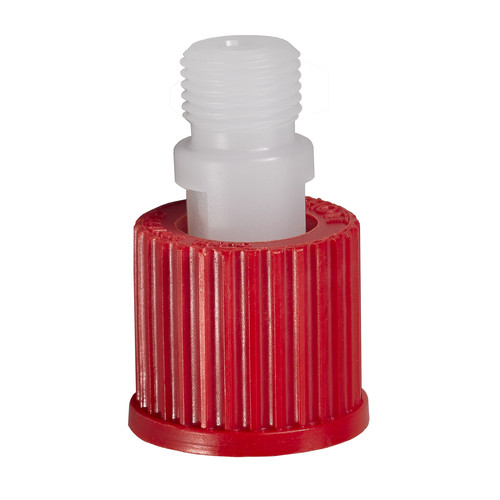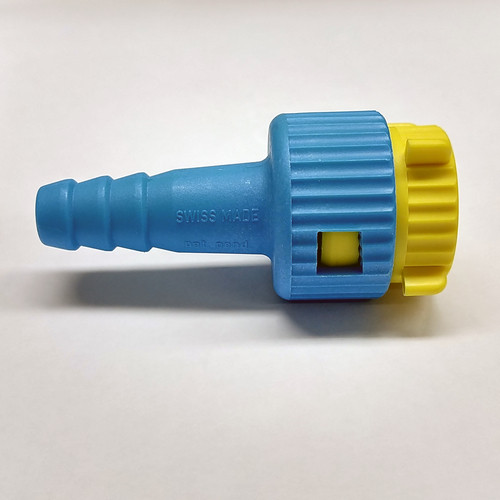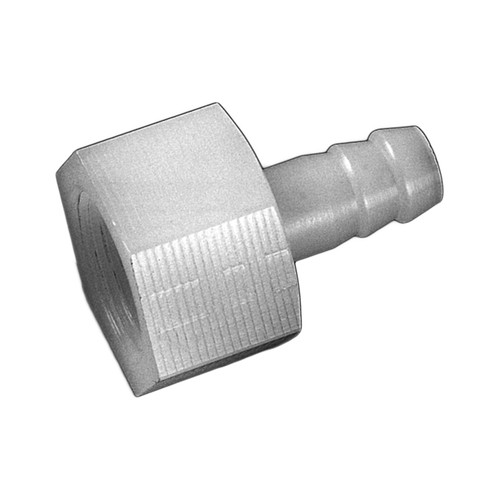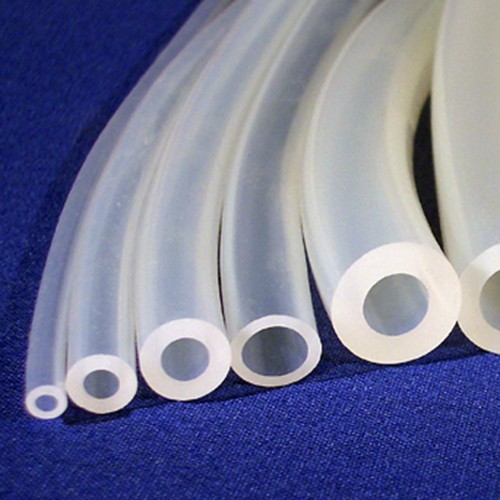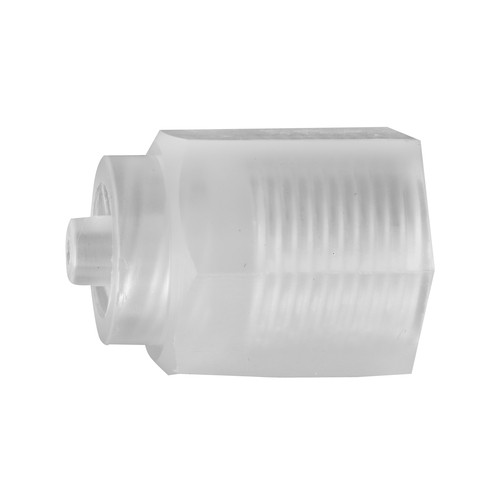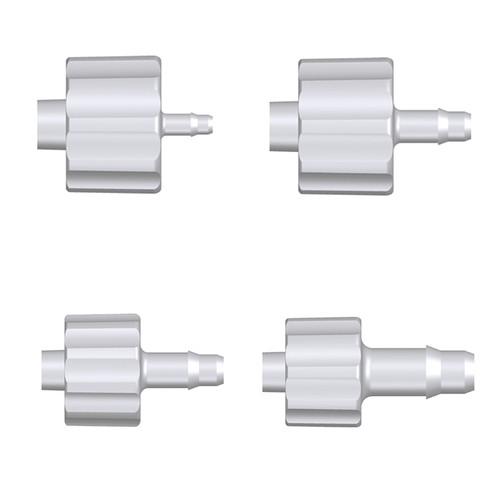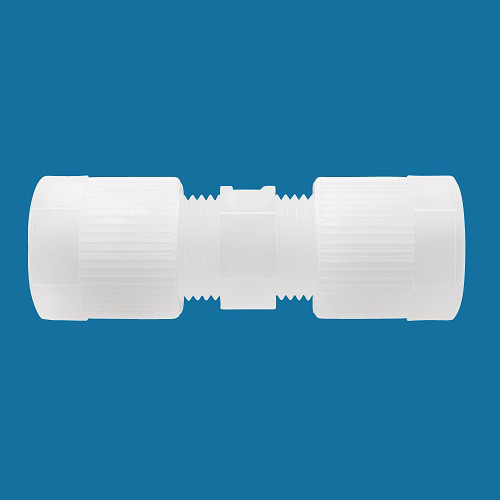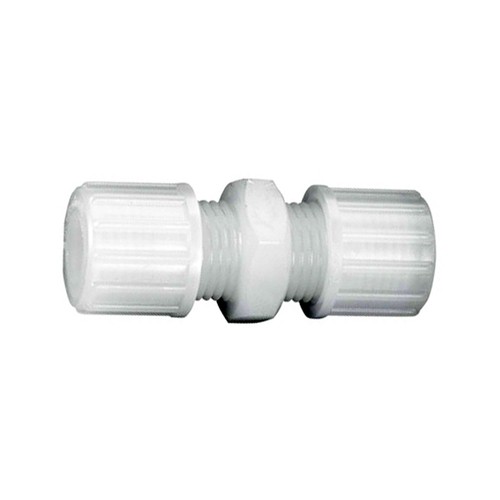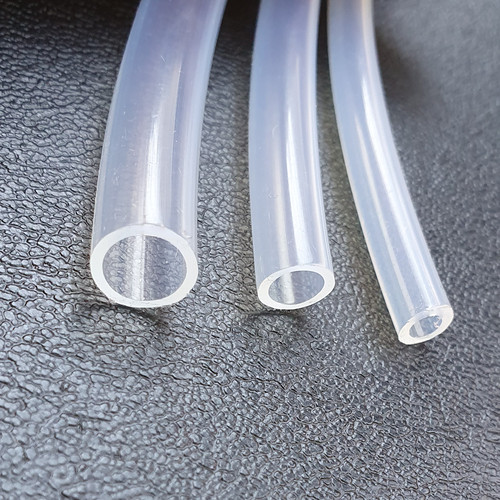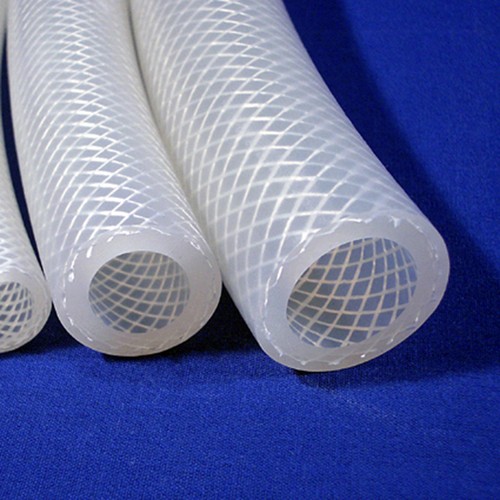Thread adapter made of PP, PVDF or PFA - loose GL-nut
Product specification
External thread on one side, loose union nut with GL thread and O-ring on the other side.
The glass thread adapter serves as a connecting element between a laboratory glass cylinder with GL thread and a G external thread.
The adapter is designed for a maximum of 6 bar (at +20 °C).
General Information
The glass thread adapter G3 serves as a connecting element between the laboratory glass cylinder with GL thread and either a hose or pipe connection or a external G-thread.
The adapter has on the one hand the rotatable union nut with GL thread, on the other hand a external G-thread, a hose or pipe connection, so that there are various connection options.
Available in PP, PVDF or PFA (high-quality materials) for chemically demanding applications.
The GL union nut is made of PBT (polybutylene terephthalate) with 30 % glass fiber.
An O-ring made of FPM is used for sealing, which can also be exchanged for EPDM or FFKM on request.
PP (Polypropylene)
Extremely good impact toughness and notch impact strength
Higher hardness and stiffness as well as better resilience than PE
Thermoforming possible
Very good dielectrical properties
Good resistance to alcohols, ketones, conc. acids and alkalis
Not stable to aromatic hydrocarbons, fats and oils, halogenes
Autoclavable
Resistant to hydrolysis
Physiologically safe
Regulatory compliance to FDA 21 CFR 177.1520, RoHS, BPA-free, DEHP-free, BSE/ADI-free
Colour: grey
Density: 0.90 g/cm3
Temperature range: +5 to +90 °C
Shore hardness D: 72°
Max. operating pressure: 6 bar at +20 °C
Water absorption: <0.05 %
Tensile strength: 25 - 40 N/mm2
Elongation at break: 800 %
Surface resistance: >1013 Ohm
Melt flow index MFR: 0.3 g/10 min.
PVDF (Polyvinylidene fluoride)
High-quality technical plastic for chemical apparatus and machine building, especially in the petrochemical, metallurgical, pharmaceutical, food processing, paper and textile industry as well as in the nuclear technology.
High impact toughness even at low temperatures
Good breakdown strength
Low dielectric loss factor
Highest mechanical stability and stiffness
Meeting highest purity requirements
Comply with the guidelines from FDA and USP class VI, additionally PVDF has the KTW approval. Up to +150 °C it is non-toxic and since it has a similar property to glass it is a no-culture medium for microorganisms.
Can be treated by autoclave (absolute sterile) and sterilized with gamma-rays without losing its mechanical qualities
Outstanding resistance to UV, weather and aging
Flame-resistant
High thermal stability
Resistant to alcohols, fats and oils, halogenes, alkalis, acids
Not stable to aromatic hydrocarbons, ketones, amines, pyridine, dimethylformamide, hot alkalis, fuming sulfuric acid
Colour: nature, slightly translucent
Density: 1.75 g/cm3
Temperature range: -40 to +140 °C
Shore hardness D: 79°
Max. operating pressure: 6 bar at +20 °C
Water absorption: <0.04 %
Tensile strength: 38 - 50 N/mm2
Surface resistance: >1013 Ohm
Melt flow index MFR: 6 g/10 min.
PFA (Perfluoroalkoxy)
High-quality technical plastic for chemical apparatus and machine construction as well as electrical engineering
Chemical, thermal and dielectrical properties practically such as PTFE, but suitable for thermoplastic processing (welding, die casting, deep drawing). Lower medium diffusion, better transparency, larger hardness and better dimensional stability (lower tendency to cold flow) compared to PTFE.
Highest temperature resistance of all meltable fluorinated plastics
Very high dimensional stability in heat
Very high resistance to media
Very good pressure resistance
Low friction coefficient
Can be treated by autoclave (absolute sterile)
Comply with the guidelines from FDA and USP class VI.
Excellent resistance to weather
Flame-resistant
Colour: milky, translucent
Density: 2.10 g/cm3
Temperature range: -200 to +200 °C (highest dimensional stability in heat)
Shore hardness D: 60° to 65°
Max. operating pressure: 6 bar at +20 °C
Coefficient of sliding friction: 0.2 - 0.3 (dynamic against steel, dry)
Tensile strength: 27 to 32 N/mm2 at +23 °C
Water absorption: <0.03 %
Dielectric constant: 2,1
Surface resistance: >1017 Ohm
FPM (Fluorinated rubber)
FPM is a polymer of highest quality made of fluorinated hydrocarbons (fluorine content 64 % to 70 %) and belongs to the group of elastomers
FPM has the best resistance to swelling in mineral oils compared to all elastomers
Highest sealing force in continuous operation (after 100 h at +150 °C in air still 90 % of the initial sealing force)
Lowest evaporation rates at high vacuum
Low permeability to gas
Outstanding radiation resistance
Excellent chemical and physical properties, almost identical to those of PTFE. The essential difference compared to PTFE is the lower cold flow, lower diffusion and better transparency.
High chemical resistance to many chemicals, ozone, heat and weather.
Unstable to polar solvents such as ketones and esters (considerable swelling), organic acids (acetic acid or formic acid), strong bases such as amines (chemical attack).
Not suitable for applications at temperatures below -20 °C as well as in hot steam.
Colour: black
Density: 1.10 g/cm3
Temperature range: -30 to +220 °C, for a short time +300 °C
Water absorption: no data
Tensile strength: 13 N/mm2
Elongation at break: 450 %
Shore hardness A: 75°
Surface resistance: no data
| Item | Image | External thread | Innengewinde |
D1 mm
|
l mm
|
L mm
|
SW mm
| Werkstoff |
Einheit Stück
|
Price Euro* | Buy |
|---|
Item
|
Image
|
External thread
|
Innengewinde
|
D1 mm
|
l mm
|
L mm
|
SW mm
|
Werkstoff
|
Einheit Stück
|
Price Euro* |
Buy
|
|---|---|---|---|---|---|---|---|---|---|---|---|
| 341945 |
|
G 1/8" | GL14 | 20 | 8 | 32 | 8 | PP | 1 | 20.00 | |
| 341946 |
|
G 1/8" | GL14 | 20 | 8 | 32 | 8 | PVDF | 1 | 22.00 | |
| 341947 |
|
G 1/8" | GL14 | 20 | 8 | 32 | 8 | PTFE | 1 | 38.00 | |
| 341948 |
|
G 1/8" | GL18 | 24 | 8 | 31 | 11 | PP | 1 | 20.00 | |
| 341949 |
|
G 1/8" | GL18 | 24 | 8 | 31 | 11 | PVDF | 1 | 22.00 | |
| 341950 |
|
G 1/8" | GL18 | 24 | 8 | 31 | 11 | PFA | 1 | 38.00 | |
| 341951 |
|
G 1/8" | GL25 | 33 | 8 | 35 | 14 | PP | 1 | 20.00 | |
| 341952 |
|
G 1/8" | GL25 | 33 | 8 | 35 | 14 | PVDF | 1 | 22.00 | |
| 341953 |
|
G 1/8" | GL25 | 33 | 8 | 35 | 14 | PFA | 1 | 39.00 | |
| 341954 |
|
G 1/8" | GL32 | 42 | 8 | 39 | 18 | PP | 1 | 32.00 | |
| 341955 |
|
G 1/8" | GL32 | 42 | 8 | 39 | 18 | PVDF | 1 | 35.00 | |
| 341956 |
|
G 1/8" | GL32 | 42 | 8 | 39 | 18 | PFA | 1 | 60.00 | |
| 3419571 |
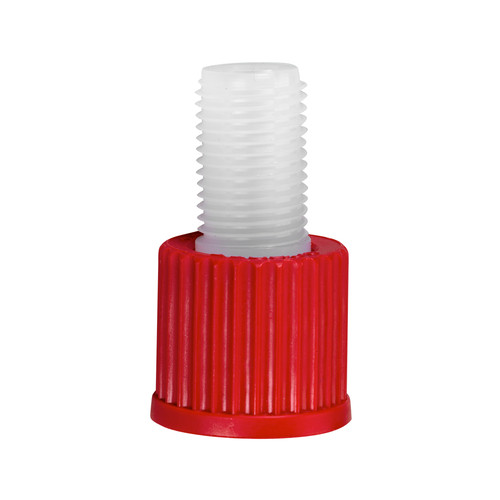 Thread adapter made of PP, PVDF or PFA - loose GL-nut
Thread adapter made of PP, PVDF or PFA - loose GL-nut
|
G 1/4" | GL18 | 24 | 20 | 35 | 14 | PP | 1 | 22.00 | |
| 3419581 |
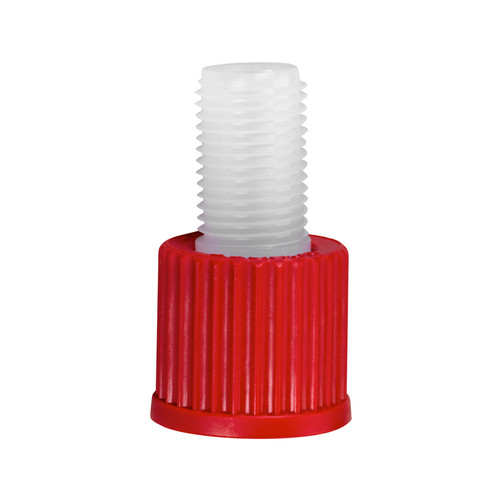 Thread adapter made of PP, PVDF or PFA - loose GL-nut
Thread adapter made of PP, PVDF or PFA - loose GL-nut
|
G 1/4" | GL18 | 24 | 20 | 35 | 14 | PVDF | 1 | 25.00 | |
| 3419591 |
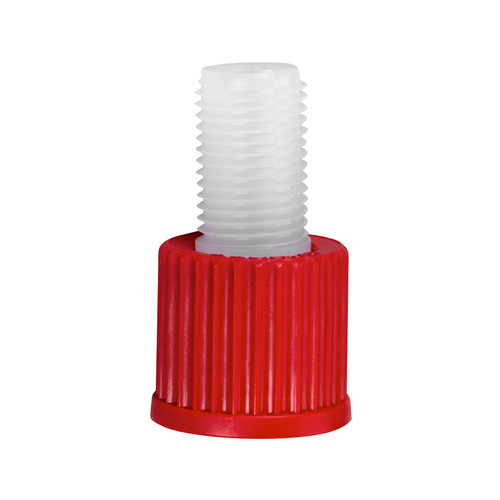 Thread adapter made of PP, PVDF or PFA - loose GL-nut
Thread adapter made of PP, PVDF or PFA - loose GL-nut
|
G 1/4" | GL18 | 24 | 20 | 35 | 14 | PFA | 1 | 43.00 | |
| 341960 |
|
G 1/4" | GL25 | 33 | 12 | 39 | 16 | PP | 1 | 22.00 | |
| 341961 |
|
G 1/4" | GL25 | 33 | 12 | 39 | 16 | PVDF | 1 | 25.00 | |
| 341962 |
|
G 1/4" | GL25 | 33 | 12 | 39 | 16 | PFA | 1 | 43.00 | |
| 341963 |
|
G 1/4" | GL32 | 42 | 12 | 43 | 21 | PP | 1 | 23.00 | |
| 341964 |
|
G 1/4" | GL32 | 42 | 12 | 43 | 21 | PVDF | 1 | 25.00 | |
| 341965 |
|
G 1/4" | GL32 | 42 | 12 | 43 | 21 | PFA | 1 | 44.00 | |
| 341966 |
|
G 1/4" | GL45 | 55 | 12 | 45 | 28 | PP | 1 | 36.00 | |
| 341967 |
|
G 1/4" | GL45 | 55 | 12 | 45 | 28 | PVDF | 1 | 40.00 | |
| 341968 |
|
G 1/4" | GL45 | 55 | 12 | 45 | 28 | PFA | 1 | 70.00 | |
| 3419692 |
|
G 3/8" | GL18 | 24 | 12 | 35 | 14 | PP | 1 | 32.00 |






